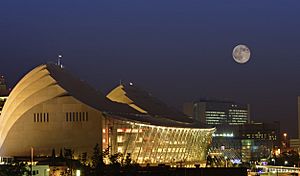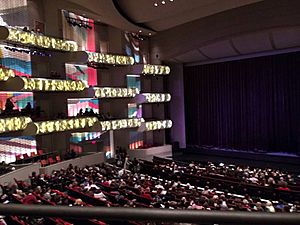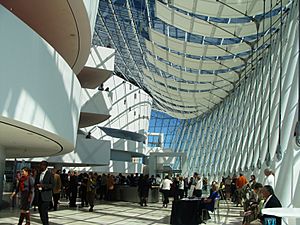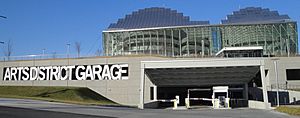Kauffman Center for the Performing Arts facts for kids
 |
|
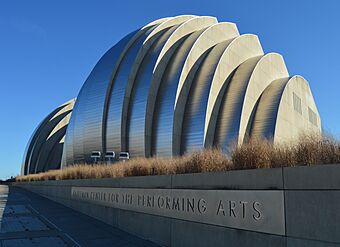 |
|
| Address | 1601 Broadway Kansas City, Missouri United States |
|---|---|
| Coordinates | 39°05′37″N 94°35′13″W / 39.093698°N 94.586824°W |
| Public transit | KC Streetcar: Kauffman Center |
| Type | Performing arts center |
| Capacity | Helzberg Hall: 1,600 Muriel Kauffman Theatre: 1,800 |
| Construction | |
| Opened | September 16, 2011 |
| Architect | Moshe Safdie |
The Kauffman Center for the Performing Arts is a special place in Kansas City, Missouri, USA. It is located downtown, near other cool spots like the Power & Light District. This amazing building opened in 2011.
It has two main performance areas inside. One is the Muriel Kauffman Theatre, which has 1,800 seats. This theater is home to the Kansas City Ballet and the Lyric Opera of Kansas City. The other area is Helzberg Hall, with 1,600 seats. This hall is where the Kansas City Symphony Orchestra performs. Many other artists and groups also perform at the Kauffman Center.
Building the Kauffman Center helped make downtown Kansas City a more exciting place. The project was funded by donations, not by taxpayer money. The city did help by building a large parking garage next to the center. Before 2011, the main groups that perform here used to be at the Lyric Theatre.
Contents
Building the Center
How the Idea Started
The idea for a performing arts center in Kansas City began in 1994. It was Muriel Kauffman who first dreamed of this place. After she passed away in 1995, her daughter, Julia Irene Kauffman, worked to make her mother's dream come true. A study in 1997 showed that the idea was possible. This report helped Julia and her team plan how to build the center.
In 1999, the Muriel McBrien Kauffman Foundation bought a large piece of land. This land was chosen as the perfect spot for the new center. By 2000, the team picked Moshe Safdie as the main architect. He is a famous architect known for designing unique buildings around the world. When he visited Kansas City, he sketched his first idea for the center on a napkin. This sketch later became the amazing building we see today.
Safdie showed his final design in May 2002. Construction officially began on October 6, 2006. The building was named the Kauffman Center for the Performing Arts.
Design and Construction Details
Designing and building the Kauffman Center was a very complex job. It took almost five years to finish. The building uses a lot of glass, concrete, and steel. The main entrance area, called the Brandmeyer Great Hall, has a glass ceiling and slanted glass walls. These walls offer a wide view of Kansas City.
Twenty-seven strong steel cables on the south side of the building help hold the glass walls in place. These cables are anchored deep into the ground. When they were tightened, the whole steel structure moved a few inches. This tension makes the building very stable. The Kauffman Center covers about 13 acres. This includes beautiful outdoor areas built over a large parking garage. The entire project cost about $413 million. This amount included money for the building and for its ongoing operations.
The Kauffman Center was designed by several experts. Moshe Safdie was the lead architect. Yasuhisa Toyota worked on the sound quality. Theatre Projects Consultants helped with the theater design. Many engineering firms also helped make the building strong and safe.
Unique Architecture
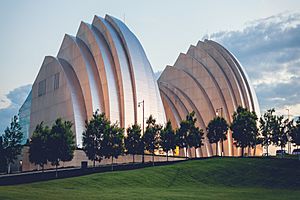
The outside of the center looks like two curved shells. These shells open up towards the south. Each shell holds one of the performance halls. This means each hall has its own great sound quality. The back areas, where performers get ready, are shared between the two halls.
The south side of the center is made completely of glass. Safdie described the lobby as a "glass tent-like structure." From inside the Brandmeyer Great Hall, you can see the city. From outside, the building looks like a clear box, showing the people inside.
Performance Areas
The Kauffman Center has two main performance halls: the Muriel Kauffman Theatre and Helzberg Hall. These halls share a large backstage area. This area has dressing rooms for over 250 performers. There are also 11 rehearsal rooms. The Kauffman Center is one of the few places in the country with two or more performance halls in one building.
Having two separate halls, each designed for a specific type of performance, was a special choice. This was similar to how Kansas City built separate stadiums for its baseball and football teams years ago. The main lobby has tall windows, snack stands, a gift shop, and grand staircases.
Muriel Kauffman Theatre
The Muriel Kauffman Theatre has 1,800 seats. Its design was inspired by grand European opera houses. With many balconies and special box seats, audience members are very close to the stage. The seats are in different shades of red. The railings of the balconies glow with gold lights that dim when a show starts.
The wavy walls of the theater have a colorful painting. Students from the Kansas City Art Institute created this painting with help from Moshe Safdie. The stage is very large, and the orchestra pit can hold up to 90 musicians. A tall tower above the stage helps with scenery changes. This theater is the main home for the Kansas City Ballet and the Lyric Opera of Kansas City. It also hosts many other plays, concerts, and dance shows.
A cool feature of this theater is the Figaro Simultext Seatback System. This system shows subtitles in different languages on the back of each seat. This is helpful for operas, so you don't have to look up at a screen above the stage.
Helzberg Hall
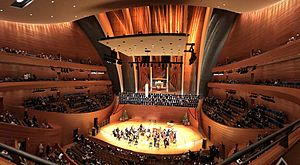
Helzberg Hall is an oval-shaped concert hall with 1,600 seats. It is the main home for the Kansas City Symphony. The stage extends into the audience area. This means even the seat farthest away is only about 100 feet from the stage. The seating surrounds the stage on all sides, making it feel very close and personal. Safdie wanted the hall to feel "intimate" and like the audience was "embracing" the musicians.
The stage itself has parts that can move up or down. This allows it to change for different performances. Helzberg Hall also has a huge pipe organ. This organ has 5,548 pipes! Only a small number of these pipes can be seen by the audience. The largest pipe is 32 feet tall and weighs about 960 pounds. After being installed and tuned, the organ was officially used for the first time on March 10, 2012.
Brandmeyer Great Hall
The Brandmeyer Great Hall connects the Muriel Kauffman Theatre and Helzberg Hall. It offers a wide view of the Kansas City skyline. This hall serves as a lobby for visitors during shows. It can also be used for special events. The white hall has open balconies that lead to the performance halls. This design allows people attending shows in either hall to see each other and the city lights below.
Partnerships and Education
The Kauffman Center works with many local groups, schools, and student organizations. In its first year, it partnered with groups like the Kansas City Friends of Alvin Ailey and the Harriman-Jewell Series. It also worked with the Heartland Men's Chorus and the Kansas City Jazz Orchestra.
The Kauffman Center has a special program called Open Doors. This program helps schools bring children to performances at the center. The Open Doors Transportation Fund helps pay for buses. The Open Doors Tickets Fund helps make tickets free or very low cost for kids from certain non-profit groups. This way, more children can experience the performing arts.
In 2012, The Grammy Museum started its Music Revolution Program at the Kauffman Center.
Arts District Garage
Next to the Kauffman Center is the Arts District garage. This parking garage is owned and run by the city. It cost $47 million to build. It provides covered parking for people visiting the center. There are even special spots for electric cars.
The roof of the garage is also part of the Kauffman Center's beautiful outdoor area. It has a "green roof" with plants and grass. This eco-friendly design helps reduce heat and is good for the environment. The green roof was designed by a local landscape architect, Jeffrey L. Bruce & Company. It helps bring back some of the natural green space that was there before construction.
Terpsichore Art Installation
Inside the Arts District garage, there is a special art project called "Terpsichore for Kansas City." This art piece is named after the Greek goddess of dance and song. It combines original music played through speakers with a four-story "light organ." The light organ has seven clear tubes with LED lights inside. These lights move and change with the music, creating a cool visual show.
See also
- List of concert halls
 | Shirley Ann Jackson |
 | Garett Morgan |
 | J. Ernest Wilkins Jr. |
 | Elijah McCoy |


